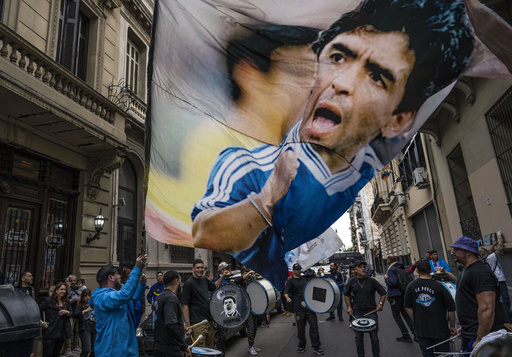
“`html
BUENOS AIRES, Argentina — Renowned for producing some of the world’s finest soccer talent and boasting three World Cup championships, Argentina is currently witnessing a significant conflict between President Javier Milei and Claudio Tapia, president of the Argentine Football Association (AFA).
Tapia is opposing Milei’s initiative aimed at transforming soccer clubs into sports limited companies, a shift inspired by the English Premier League model. Tapia advocates for the traditional structure where clubs remain in the hands of their members rather than succumbing to private ownership.
Amid this tension, the government has threatened to intervene in the AFA due to alleged irregularities surrounding Tapia’s recent re-election for a third term. However, FIFA and CONMEBOL have issued warnings that any governmental interference would lead to the expulsion of the AFA, potentially sidelining its teams from all competitions.
Last December, Milei, who is known for his libertarian economic views, signed a decree that permits soccer clubs, currently operating as civil associations, to change into public limited companies. The distinction lies in the fact that while civil associations do not have profit as their goal, public limited companies prioritize commercial gain.
The government’s ruling provides a one-year window starting from August for various sports associations and federations to revise their statutes to accommodate this new structure. Although transitioning to this model is optional, clubs that wish to do so will need a two-thirds majority vote from their members at a special assembly. Milei has suggested that this transformation would attract substantial investment into Argentine soccer, declaring an end to “poor socialism in soccer.”
In response, the AFA highlights that its regulations currently prevent the inclusion of sports corporations within its framework. They successfully obtained a court ruling that blocked Milei’s decree, although this decision has been challenged by the government, and the ultimate resolution will be determined by the Supreme Court.
“The clubs must maintain their roles as civil associations,” Tapia asserted, emphasizing his belief that the essence of these clubs should remain unchanged as many have statutes preventing such transformations.
If a club opts to adopt the public limited company status, the AFA has warned that it will be disaffiliated from the federation. Argentina is acknowledged for its impressive lineup of soccer players, including legends like Lionel Messi and Diego Maradona. Despite the country’s success in cultivating young talent, financial pressures often force clubs to sell players prematurely to sustain their professional teams as well as to support other sports and community activities.
Guillermo Tofoni, a FIFA agent and advisor in Milei’s administration, pointed out the stagnation in Argentine soccer, criticizing the chaotic scheduling and various tournament formats. He noted that such disarray deters television networks from offering lucrative deals. Currently, Argentine soccer generates less than $100 million annually from television rights, a stark contrast to the billions enjoyed by clubs in the English Premier League.
Tofoni projects that genuine private investment could enable clubs to retain their talents until they reach 24 or 25 years of age, allowing them to manage their sales to European markets strategically.
At present, only two clubs, Estudiantes La Plata and Talleres de Córdoba, have publicly endorsed the idea of welcoming private investment into soccer. Estudiantes president Juan Sebastián Verón, acknowledging the business aspect of soccer, stated, “Let us not fear growth and the new opportunities that could lead us to significant advancements in the future.”
Verón recently entered into a preliminary agreement with American investor Foster Gillett, promising a $150 million investment into the club. This deal will allow the investor to benefit from future player sales, commercial ventures related to the stadium, and profits from international competitions, subject to approval by the club’s members during a special assembly.
In a further complication, Tapia convened an election for new AFA officials a year earlier than expected, successfully securing his re-election for a third term on October 17, thereby extending his tenure until 2028—a full year beyond the conclusion of Milei’s presidency.
Milei criticized this turn of events as reminiscent of the political situation in Venezuela under Nicolás Maduro. Shortly thereafter, he enacted a decree that stripped the AFA of social security benefits. The General Inspection of Justice, responsible for overseeing civil associations, challenged Tapia’s re-election and threatened intervention in the AFA but faced a setback when a civil appeals court upheld the results of the October election.
FIFA and CONMEBOL continue to monitor the situation closely and have reiterated that only the national federation has the authority to dictate the structural framework of clubs. They expressed that state interference would necessitate disaffiliation from international activities. FIFA underscored that the AFA is the sole responsible entity for governance concerning the legal nature of affiliated clubs, as noted by FIFA President Gianni Infantino, who congratulated Tapia on his re-election and acknowledged his contributions to the sport’s advancement.
“`
